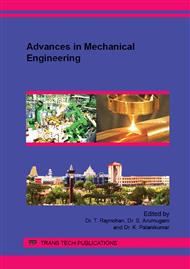p.830
p.836
p.841
p.846
p.851
p.857
p.862
p.866
p.874
Performance and Emissions Analysis of a Diesel Engine Using Various Bio-Fuels
Abstract:
Rapid depletion of conventional fuels and growing requirements has led the researchers towards alternative sources like bio-fuels. Present work discusses the suitability of those bio-fuels in a naturally aspirated diesel engine by comparing the performance. Initially, the effect of bio-fuels on fuel consumption and thermal efficiencies are studied and compared with diesel. Thermal efficiency is improved and specific fuel consumption reduced, particularly with karanja oil when compared to diesel. Secondly, the energy balance of the engine is compared. Heat losses are found reducing in bio-fuels due to viscosity and heat rejected to coolant is found less with karanja oil when compared to diesel. Also, the engine emissions, particularly oxides of carbon, nitric oxides, and unburned hydrocarbons from bio-fuels and diesel are sensed using five-gas analyzer and compared. NOx and CO2 emissions are slightly more in bio-fuels when compared to diesel, while CO and HC emissions are less for bio-fuels.
Info:
Periodical:
Pages:
851-856
Citation:
Online since:
November 2015
Keywords:
Price:
Сopyright:
© 2015 Trans Tech Publications Ltd. All Rights Reserved
Share:
Citation:


